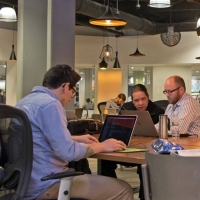To provide the best experiences, we use technologies like cookies to store and/or access device information. Consenting to these technologies will allow us to process data such as browsing behaviour or unique IDs on this site. Not consenting or withdrawing consent, may adversely affect certain features and functions.
The technical storage or access is strictly necessary for the legitimate purpose of enabling the use of a specific service explicitly requested by the subscriber or user, or for the sole purpose of carrying out the transmission of a communication over an electronic communications network.
The technical storage or access is necessary for the legitimate purpose of storing preferences that are not requested by the subscriber or user.
The technical storage or access that is used exclusively for statistical purposes.
The technical storage or access that is used exclusively for anonymous statistical purposes. Without a subpoena, voluntary compliance on the part of your Internet Service Provider, or additional records from a third party, information stored or retrieved for this purpose alone cannot usually be used to identify you.
The technical storage or access is required to create user profiles to send advertising, or to track the user on a website or across several websites for similar marketing purposes.
 People’s workplace experience in the wake of recent economic upheavals is to be investigated as part of a major new survey led by Cardiff University and funded mainly by the Economic and Social Research Council (ESRC). The Skills and Employment Survey 2023 (SES2023), which also involves researchers at UCL, the Universities of Oxford and Surrey and the National Centre for Social Research, will help academics assess the impact of an extraordinary period of turbulence for workers which includes the economic downturn, Cost-of-Living Crisis, Covid-19 and Brexit. (more…)
People’s workplace experience in the wake of recent economic upheavals is to be investigated as part of a major new survey led by Cardiff University and funded mainly by the Economic and Social Research Council (ESRC). The Skills and Employment Survey 2023 (SES2023), which also involves researchers at UCL, the Universities of Oxford and Surrey and the National Centre for Social Research, will help academics assess the impact of an extraordinary period of turbulence for workers which includes the economic downturn, Cost-of-Living Crisis, Covid-19 and Brexit. (more…)


















 All of humanity’s problems,” the French scientist and philosopher Blaise Pascal wrote in 1654, “stem from man’s inability to sit quietly in a room alone.” He may have been right, but then again, sitting in a room alone isn’t necessarily a great state of permanent being either. There was a time we used to talk with dismay about the Japanese phenomenon of intense social distancing known as hikikomori. We would consider with horror the isolation, lack of engagement with society, poor mental health and loneliness of the people who had almost completely withdrawn to their rooms. Those poor bastards locked up in enclosed spaces linked to the outside world only by screens.
All of humanity’s problems,” the French scientist and philosopher Blaise Pascal wrote in 1654, “stem from man’s inability to sit quietly in a room alone.” He may have been right, but then again, sitting in a room alone isn’t necessarily a great state of permanent being either. There was a time we used to talk with dismay about the Japanese phenomenon of intense social distancing known as hikikomori. We would consider with horror the isolation, lack of engagement with society, poor mental health and loneliness of the people who had almost completely withdrawn to their rooms. Those poor bastards locked up in enclosed spaces linked to the outside world only by screens. 
















February 10, 2023
Working parents are resilient, and a resilient team is good for business
by Erin Eatough • Comment, Wellbeing